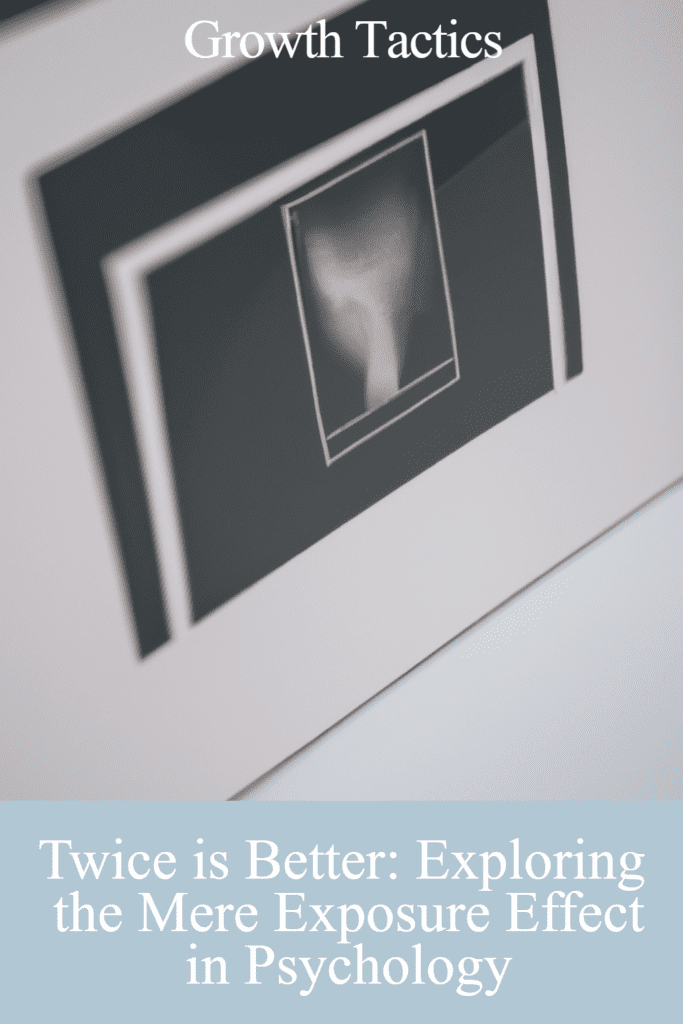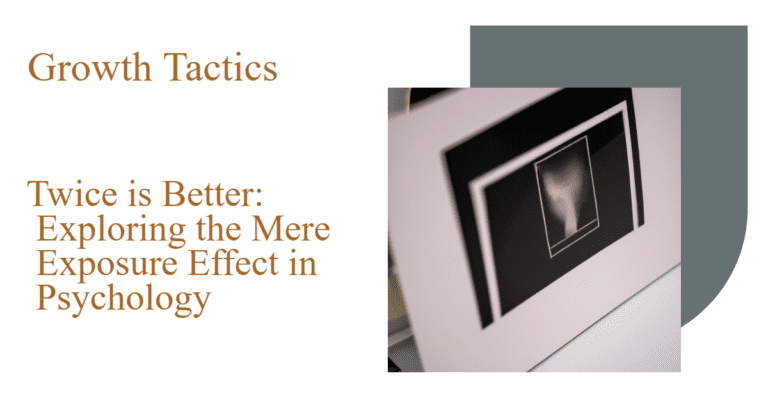Do you ever find yourself liking a song more after you’ve heard it a few times? Or maybe you’ve discovered a fondness for a food that you once despised as a child. This might not be by chance, it could be down to the mere exposure effect in psychology. Dive into this read and join me on an exciting psychological journey, unfolding why and how familiarity does not make our heart grow fonder, but our mind.
Jump To Section
Setting Off the Journey: Understanding the Mere Exposure Effect
This little trick our brain plays on us convinces us to prefer things we’re familiar with. Discovered by Robert Zajonc, an American social psychologist, states that repeated exposure to a stimulus (could be anything, an object, a person, or even a song) leads to a more favorable view of the stimulus. And here’s the twist, the exposure may even be subliminal.
Why We Crave the Comfort of Familiarity
You know that cozy feeling of snuggling up with your favorite blanket, or the instant relief of coming home to a well-known environment after a long trip? There’s something about being familiar with things that just make us feel at ease. It’s kind of like our brain’s way of wrapping us in a warm embrace, saying “Hey, I got this. No worries here.”
But why is that you ask? Well, our preference for familiarity is deeply rooted in our human nature. The brain prefers things it can process more easily and generally perceives familiar items to be less risky. Imagine taking a stroll in your neighborhood – you know the route, nothing feels dangerous or threatening. It’s also because, as social beings, we’re wired to seek stability and continuity in our lives. Familiar faces, places, or even our favorite tunes provide us with that comforting sense of predictability. It’s as if our brain tells us, “Relax, friend. Nothing’s going to surprise you here.”
Unwrapping the Package: What Causes the Mere Exposure Effect?
A crucial cog in this wheel is perceptual fluency. The ease with which our brain processes information. The hypothesis is simple – the more frequently we encounter something, the easier it becomes to process it, and thus we end up liking it. This perceptual fluency leads to what is known as the familiarity principle. Imagine hearing nonsense words – over time you begin to interpret things, place meanings, and they don’t seem so nonsensical anymore!
Second Layer: The Role of Repeated Exposure
The repeated exposure of an individual to a stimulus is like a magic trick. It increases liking for the stimulus, be it Chinese characters for someone who can’t read Chinese or abstract shapes. Studies have shown that repeated exposure to a stimulus, even if subliminally, tends to show an increased preference for it. Almost like how you slowly fall in love with that catchy jingle playing in between your favorite TV show!
Connecting the Dots: How Liking of Repeated Items Influences Memory
Ever had that moment when lyrics from a childhood song you haven’t heard in years suddenly pop into your memory, or when you instantly remember the recipe of your grandma’s famous pecan pie you haven’t baked in a long while? Well, we’ve all been there, and it’s all down to the increased liking of repeated items and how it influences our memory.
So, let’s chat a bit more about this. See, our brains are pretty spectacular – they work in ways that are sometimes even beyond our comprehension. This process is somewhat like embedding a favorite song in our brain – the more we listen to it, the more we hum it, and the more familiar it becomes. Before we know it, we find ourselves humming the tune while doing chores around the house without consciously memorizing the lyrics.
Similarly, when we’re repeatedly exposed to the same information or stimulus, it sort of gets etched deeper into our memories. Isn’t it fascinating how that happens, almost effortlessly?
Now, you may be wondering if there’s any scientific proof to back this up, right? Indeed, my friend, there is! A study found that both younger and older adults had better memory recall for words that they were exposed to multiple times. So, simply repeating something could indeed be an effective way to remember it.
So next time you’re trying to remember something, don’t fret. Just give it a couple of more tries – repeat, revisit, rehearse. Your brain’s mere exposure effect will do the rest, helping you remember in ways you’d least expect it! Now, isn’t that a handy tip for the next time you walk into the grocery store and try to remember the shopping list you left at home?. Okay, maybe not so much for that, as there’s a limit to how many times you can repeat a shopping list in one drive!
The Flip Side: Can You Avoid the Mere Exposure Effect?
Pause for a moment and let’s play a little game of “what if”. What if I told you that you could potentially avoid getting drawn in by the mere exposure effect? I know what you’re thinking– “But wait, are we not wired to prefer the familiar?”
Indeed, you are correct, dear reader. Our brains do tend to walk down the beaten path of comfort and familiarity, but there’s always room for a bit of a twist in the plot, isn’t there?
Now, let’s ponder this. Remember the times when you’ve caught yourself reaching for the same brand of cereal at the supermarket each time, even though there’s a whole aisle full of other options? Or do you default to the same coffee shop en route to work when there are dozens to try from? That’s the mere exposure effect playing its tune.
But worry not, my fine friend, there’s a way out from this charming spell. And it starts with a simple ‘awareness’. Knowing about the mere exposure effect is a big step towards making more diverse choices.
The next time you catch yourself getting drawn towards the familiar, question it. Ask yourself “Am I interested in this because it’s truly the best option, or is it because I’m just used to it?” Break the process down. It could be a book, a brand, or a movie genre, give other options a fair chance.
Remember when you first heard your new favorite band and you weren’t quite sure if you liked the sound? But look at how they’ve grown on you now! In the same way, exploring new arenas may seem a bit out of your comfort zone initially, but who knows where these unknown paths could lead you?
In any case, it’s all part of our amazing human journey, isn’t it? So yes, you can bypass the mere exposure effect once you’re aware of it. But remember, it’s not so much about completely avoiding it, but rather about opening our minds up to the vibrant variety life has to offer.
Embrace the new, seek the different, and surprise your senses. After all, the best flavor could be one spoonful away! Just, maybe try not to surprise your taste buds with broccoli ice cream, okay? Some things are just better left unexplored!
Is the Mere Exposure Effect Bad?
We’ve been talking about the mere exposure effect, and it’s natural to wonder if it’s bad. Does it tie us to the same old things and stop us from finding the new and exciting? Let’s explore this together.
Truth is, it’s not simply “good” or “bad.” Think of life as a movie. There are familiar scenes that make you feel safe and predictable, and then there are thrilling plot twists that keep you on your toes.
In this grand movie of life, the mere exposure effect is like the comfort food you eat during the show. You love it because it makes you feel good and cozy. But sometimes, a new snack might catch your eye.
The mere exposure effect makes us like the familiar and that’s not entirely bad. Imagine choosing your breakfast cereal every morning from thirty different brands or deciding a new route for your daily run each time. Sounds tiring, right? The mere exposure effect helps by saving us from too many decisions.
But here’s the other side. There might be a new cereal flavor or a scenic run waiting to be found. Knowing that we prefer familiar things can help us choose to try something new.
Is the mere exposure effect bad? Not necessarily. It’s like an old friend that gives comfort, but sometimes we want to meet new friends. It’s all about balance and awareness.
Twice is Better – Or is it?
The mere exposure effect means we like things more when we see them often. But does it always work? This psychological trick is strongest when we don’t notice it happening. And if you already dislike something, seeing it more won’t make you like it. So, you won’t start liking broccoli just by looking at it more!
Your brain thinks, “If I’ve seen it before, it must be good.” But remember, you’re in control. Keep exploring new things. You might find something you love. Life begins at the end of your comfort zone, after all.
Actionable Tips for Utilizing the Mere Exposure Effect in Various Scenarios
The mere exposure effect is a powerful psychological phenomenon, but how can it be applied effectively in different aspects of life? Here are some actionable tips on how to harness this effect in various scenarios:
1. Marketing and Advertising
- Consistent Branding: Ensure your brand’s logo, colors, and slogans are consistently seen across multiple channels – social media, print ads, websites, and physical locations. Repeated exposure can increase consumers’ familiarity and favorability towards your brand.
- Regular Engagement: Engage with your audience regularly through newsletters, social media posts, and blog updates. Frequent interaction can strengthen the relationship and encourage loyalty.
2. Learning and Education
- Repetition in Study Sessions: When learning new material, revisit the same concepts multiple times. This can be done through spaced repetition techniques where the information is reviewed at increasing intervals.
- Multimodal Exposure: Present information in various formats – visual, auditory, and kinesthetic. This ensures repeated exposure in different contexts, making the material more familiar and easier to recall.
3. Personal Relationships
- Frequent Communication: Maintain regular contact with friends and family. Simple gestures like regular texts, calls, or meet-ups can deepens emotional bonds because of familiarity.
- Shared Experiences: Engage in familiar activities together, such as favorite hobbies or recurring events. The repeated positive experiences can reinforce the bond between individuals.
4. Workplace and Professional Growth
- Visibility at Work: Participate in meetings, presentations, and team projects. Consistent visibility can help colleagues and superiors become more familiar and favorable towards you.
- Ongoing Skill Development: Regularly practice and refine your skills. The more you engage with specific tasks or knowledge areas, the more proficient and appreciated you become.
5. Public Speaking and Media Influence
- Consistent Messaging: If advocating for a cause or delivering public speeches, repeat key messages and core values. Repetition ensures the audience becomes familiar with and accepts the message.
- Media Presence: Regularly feature in various media outlets – television, podcasts, blogs. This increases public exposure and builds a positive and familiar image in the minds of the audience.
By being mindful and strategic about the principle of mere exposure, we can improve chances of success in marketing campaigns, learning endeavors, interpersonal relationships, professional development, and public influence. Remember, the key is consistent, modest, and genuine exposure to create a positive and lasting impact.


